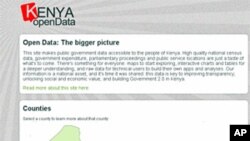The Kenyan government recently launched its Open Data portal that offers access to government information. Parliamentary Hansards - a record of debates in Parliament - were also made available on-line at a separate launch. Organizers say offering such information online will increase the government’s accountability to the people, while critics charge that the websites are merely window dressing.
It’s been touted as Sub-Saharan Africa’s largest data portal. It contains details on national and county government spending, the national census, the location of schools, health facilities, water, and other infrastructure, service availability at the county level, and the allocation of Constituency Development Funds, or CDFs.
The Kenya ICT Board, a state corporation, manages the portal. Chief Executive Officer Paul Kukubo says that, up until now, people wanting such facts and figures would have to purchase and pore through books from the government printer.
He says that the portal adds an extra dimension to information gathering and interpretation.
“The way the open data sites work is that you have core data, and then you as the user can make the relationships between different data sets," said Kukubo. "So, for example, we have data on health and we have data on expenditure in the Ministry of Health and we may have data on, say, illnesses. You can then relate to whatever data as long as it refers to the same geographical space or the same time.”
For Kukubo, it is the ordinary Kenyan citizen who benefits most from the website.
“He gets empowered, he understands his government, he understands what his government is providing, he understands the level of development in his county, basically someone who can query government and demand more in services based on what he sees from the data," he said.
In the same week, Kenya’s parliament, along with the ICT Board and other partners, launched a website housing the country’s Hansards, or Parliamentary Debates, stretching back more than 40 years.
Michael Murungi is chief executive officer of the National Council for Law Reporting, a state corporation that is one of the website’s partners. He says that people can now follow what their representatives say in parliament and can advise the politicians on how to tackle issues.
“Now that members of parliament know that members of the public can easily search and cross-reference the online archive of the Hansards, then I think the quality of their debate is going to go up and it will inform their decision-making and the quality of their contributions and their feeling that, more than before, they are going to be held to account for something they’ve said on the floor of the House," said Murungi.
But some critics beg to differ. Mwalimu Mati is head of Mars Group Kenya, a watchdog that monitors government budgets, policies, and other activities.
He says that, in his experience, the challenge is not so much getting the information as it is holding representatives to account. Mati says government still has, in his words, “the old culture of secrecy and hostility” when dealing with the public, and sees any questioning as a direct attack on the government.
“There are bureaucracies in the legislature, in the central government; and the courts are still largely unreformed, so we are not much better off just by virtue of having an Internet platform," said Mati. "The key is when the government is truly transparent and actually is fulfilling its obligation to inform, as under the constitution.”
Mati says the websites do not contain vital information that will help fight corruption.
“You are not going to find on the open portal the curriculum vitae of any government official," he said. "You are not going to find their wealth declaration forms or their declarations of assets and liabilities and interests. The tangible information we wanted as Kenyans was to enable us to have clear sight of, at that level, who is running our government and what are their real records.”
He also says he thinks the information contained on the portal is not up to date and not easily searchable.
Kenyan Government Online Information Gets Mixed Reviews




